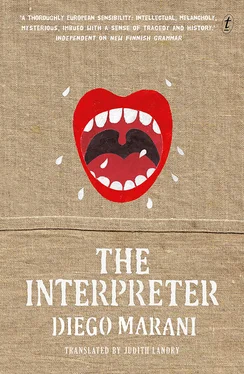I nodded. Visibly ill at ease, Stauber was inhaling noisily and wiping his sweaty hands on his trousers.
‘Loneliness can play nasty tricks. It can swallow a person up like quicksand,’ he added in a calmer voice, then carried on:
‘That man has always kept himself to himself. When it came to organising a conference he would say just the bare minimum to his colleagues, then withdraw behind that hypnotic stare of his, as though he’d ceased to see us, as though we were so many empty chairs. When you talk to him you get the feeling that there’s no one actually there, no personality, just a spongy blob of abnormal memory which has achieved its size by swallowing all the other organs of his body, which is now just an empty shell!’
I had summoned the head of the German section in order to sort out this irritating matter as quickly as possible; I was looking for the speediest and, for me, the simplest solution. I felt I was wasting my time on such improbable matters as an interpreter who raves and whistles at random. I had trouble even believing such a tale. But I was beginning to fear that such things would be the stuff of my duties as long as I remained at the head of a department dealing with such madmen. I carried on staring out of the window in order that Stauber should not see the irritation which my expression so clearly betrayed.
‘But tell me more about this raving you talk of — what exactly does it consist of?’ I asked him, still without turning around.
‘We’ve got recordings of him, if you’d like to hear them! Sometimes he stops translating right in the middle of a speech and starts uttering meaningless words which don’t exist in any language, as though he himself were trying to work out how to pronounce them. He turns them over in his mouth to see how they will sound, and scribbles illegible signs down on a piece of paper. Or he’ll carry on translating, but in a different language, one that’s got nothing to do with that particular meeting. The worst thing is when he starts to make hissing noises, or squawks perhaps, with a kind of whistle coming from the throat. People who’ve seen him say that at such times he goes completely stiff, craning his neck, lifting his chin and narrowing his eyes, as though he needed to make a special effort at concentration. Luckily, at that point his colleagues usually manage to turn off the microphone without anyone noticing and continue interpreting themselves. But he carries on chirping, pronouncing meaningless words or blethering sounds in some unknown language. It upsets the meeting, delegates turn round to stare, some even leave the hall, and the speaker stops speaking. And then they blame me! I’m the one who takes the rap; it’s me who gets called on to provide explanations!’
His voice rising to a crescendo, he tapped himself on the chest. I turned towards him and asked him brusquely: ‘In a word, Stauber, what do you suggest?’
He narrowed his eyes against the sudden burst of sunlight that was now flooding the room. But he remained totally unruffled; I felt that he had had his words prepared right from the moment he entered my office.
‘I suggest that he should be suspended forthwith and then, ideally, declared permanently unfit for work. That’s within the regulations. All the conditions are in place so no one could object. That way he’d be out from under our feet — and never fear, he’d get a golden handshake, no problem about that. Then he could spend the rest of his life calmly raving away to his heart’s content and studying all the languages he likes — there must be one or two he still has to add to his collection — without putting a spanner in our works.’
It was as though a weight had been lifted from him. I went back to my seat. What Stauber wanted from me was a signature. That would mean that the interpreter could be legitimately suspended from his post, and that the arrangements for dismissal could be set in motion. I was beginning to think that this was the only way out, the only way I could wash my hands of this whole tiresome matter. Yet still I hesitated.
‘Wouldn’t it still be preferable to see how his illness develops? We have no reason to think that it’s permanent, or incurable. He might be able to have some sort of therapy,’ I persisted.
Stauber shot me a grim look. He sat bolt upright in his chair and clasped his hands around his knees.
‘When the mower breaks down, what do you do? Hope it will mend itself?’ he asked sourly before collapsing again, puffing, into the depth of his chair.
I closed the interpreter’s file and placed my clasped hands on the table.
‘Let me think about it,’ I said, noting that at this point Stauber did not seem to know which leg to put on top of the other. He got up from his chair, straightened his jacket and awkwardly offered me his hand.
‘Stauber, how many languages does he speak?’ I asked point-blank.
‘Five …’ he said after a moment’s hesitation.
‘Which ones?’ I persisted.
‘German, Russian, French, English, Italian and Spanish. Why?’ he asked gloomily.
‘Pure curiosity!’ I answered with a smile as I accompanied him to the door. Alone in the room, I sat down again listlessly at my desk. Now the sun was high in the cloudless sky. Lashed by the wind, a distant fuzz of green was softening the sharp horizon, as though the young sap in the new grass and far-off woods were vibrating in the cold air. Shifting Irene’s photo slightly so that it would not catch the light, I found myself thinking that all in all, five languages was reasonable enough: Stauber might be a perfectly normal individual.
I had an important meeting in the afternoon. I was to meet the director-general and present my plan for the running and reorganisation of the department. The secretary trotted to and fro, bringing me file after file, each time seeming to expect me to dictate something to her or give her some task to perform; she seemed even less at ease than I was. But I couldn’t take my mind off the strange affair of the interpreter. The sound of a telephone ringing in the next-door office brought me down to earth; I drew my seat up to the desk and started to read through one of the files, leafing through the communiqués, checking on the internal regulations and the judgments of the joint committee; I even went as far as to read through the hefty psychiatrist’s report, and with some care: in the brain of his patient, Doctor Barnung had noted some reduction in the size of the hippocampus and an enlarging of the basal ganglia, together with an abnormal cerebral blood flow. Apparently his age, and certain genetic considerations, put him at risk of schizophrenia. Hallucinations and delirium were the classic symptoms of the illness — he seemed to have the lot: he saw things that weren’t there, was afraid that he was being persecuted and convinced that he was gifted with exceptional powers. The psychiatrist even had a specific term for the invention of non-existent words, namely glossolalia — a form of schizophrenia. In this man’s one-track life, trouble seemed to have built up like a poison, which had now gradually overflowed from some mysterious vessels to infect his entire brain. Intense mental exercise, study and the general rigour which seemed to have marked his habits had failed to ward off that sly disease, which was now attacking him from within, slowly defeating him like a parasite.
That man knew fifteen other languages: French, English, Dutch, Danish, Swedish, Spanish, Portuguese, Greek, Italian, Russian, Polish, Hungarian, Romanian, Japanese and Turkish. German was his mother tongue, but he also interpreted into English. He was forty-seven years old, and had been in the job for twenty-two years. His behaviour and record had been unblemished: no absences, no reprimands. Six months on the waiting-list to do a Japanese language course at Tokyo University. He’d been to the best Swiss and German interpreters’ schools and had spent long periods of study leave in dozens of countries. Held together by a now somewhat frayed elastic band was his collection of university diplomas and testimonials in any number of foreign languages. I paused to look at the photographs: one on a document asking to be entered for some competitive examination, one taken when he first took up his position, later ones on his identity card, renewed every five years. In each one he looked like a different man.
Читать дальше












